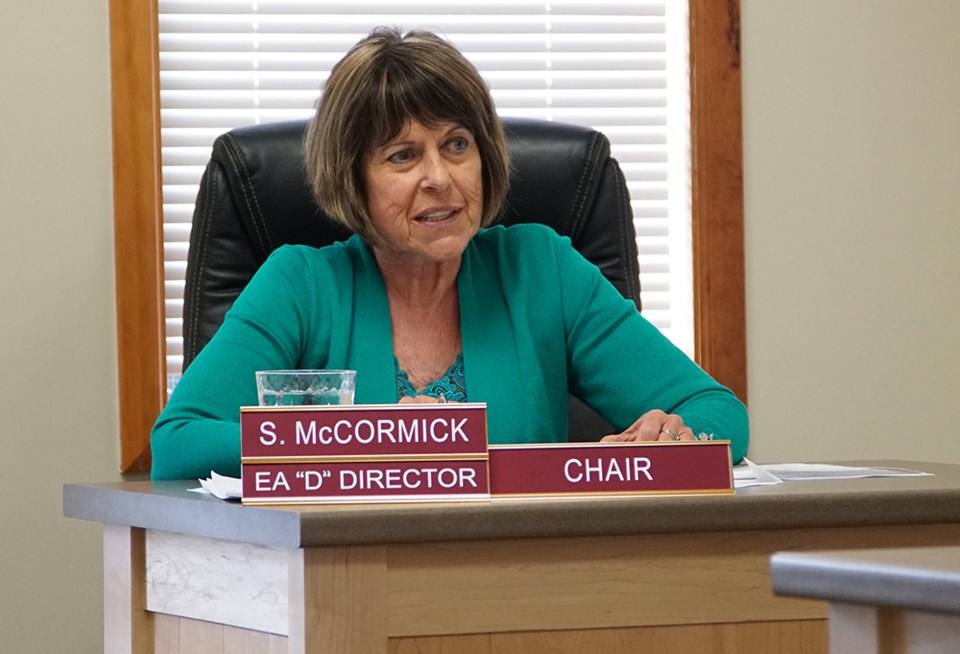qathet Regional District directors want more time for consultation on forestry issues in the Sunshine Coast forestry area.
At the April 29 regional board meeting, directors reviewed correspondence from Suzanne Senger, executive director of the Sunshine Coast conservation association, regarding a request to extend consultation on forestry visual quality objectives (VQO) in the Sunshine Coast Natural Resource District (SCNRD).
Electoral Area D director Sandy McCormick said she wanted to move receipt of the correspondence from Senger, and that the regional district write to the provincial ministry of forests, lands, natural resource operations and rural development to extend the consultation period.
“It’s really important that we get an extension in this consultation process,” said McCormick. “There has been virtually no publicity on the province’s plan to change the visual quality objectives for the Sunshine Coast natural resource district. It is suggested that under the changes proposed, we could see clear cut patches along our coast. That’s just so contrary to the way we feel in this region. The public and local governments deserve a greater opportunity to submit their comments.”
The deadline for submission was April 30, and according to Senger’s correspondence, the ministry has neglected to consult with stakeholders before the deadline.
McCormick said she also wanted to hear from ministry representatives at a qRD board or committee meeting.
City of Powell River director George Doubt said he supported the idea of writing to the forests ministry to hold off on the consultation deadline. He said he saw a very small advertisement in the newspaper some time ago about a consultation but he never saw any consultation happen locally.
“The deadline is tomorrow and I think that’s unreasonable,” said Doubt. “It is an important concept. Many people in the regional district would like to have some consultation. If we can stand up strongly and send an email tomorrow morning to the ministry saying we’d like it to be extended and find some reasonable way for everybody to have a chance to get their two bits in, it’s worth taking the time.”
The board carried a motion to receive the correspondence and ask for a deadline extension.
McCormick then made a motion to invite representatives from the forests ministry to speak to qRD representatives regarding the forestry visual quality objectives. She said she was hoping representatives could be on the agenda of the May committee of the whole meeting.
McCormick said if the ministry is not going to speak directly to the people, then it’s up to the board to speak up for what the people believe.
“I’m sure all of you are hearing from your constituents about this,” she said. “I’ve had quite a few emails just this morning regarding this whole thing.”
The board carried McCormick’s motion for a meeting.
The board then reviewed similar correspondence from Texada Island resident James Mack. The board voted to receive the letter.
SCNRD correspondence
Senger, in her correspondence, stated that land use needs have changed immeasurably within the SCNRD since VQOs were established in the 1990s. She stated that over the last 10 years, coastal communities have felt the compounding negative impacts of industrial logging on ecological and natural capital values.
“We continue to face ever-growing impacts of climate change (drought and fire), and cumulative effects on biodiversity and natural infrastructure, including on our fisheries and drinking water supply,” stated Senger. “The local economy has also changed. Knowledge and service sectors, outdoor recreation and tourism, scientific research and education are starting to edge out industrial activity as regional economic drivers.
“Some of the most spectacular scenery in Supernatural British Columbia can be found in the SCNRD and our forested landscapes are a defining feature of the coastal lifestyle and tourism product. We experience far more tourism and recreational use than we did eight to 10 years ago.”
Senger stated that since COVID-19, the amazing scenery, proximity to nature and access to outdoor recreation opportunities have become an even bigger draw for families moving from the city to small, rural communities. Protecting scenic values for recreation and tourism is critical to supporting the local economy throughout the district, she added.



